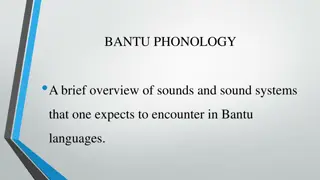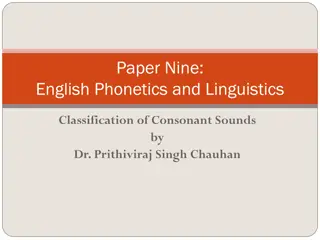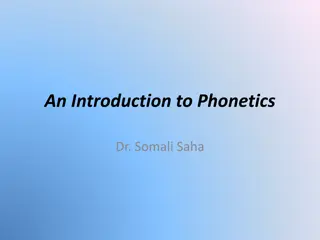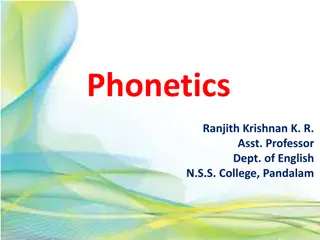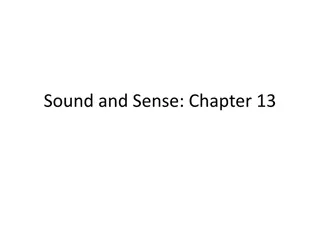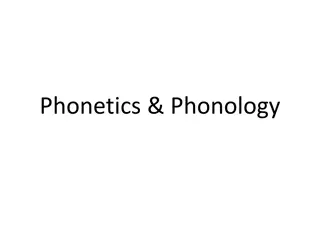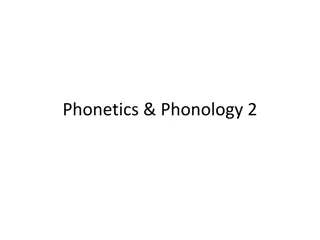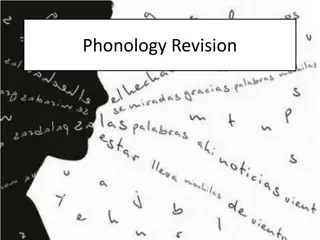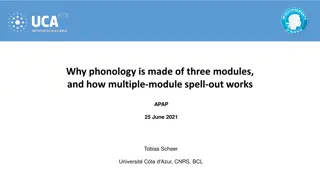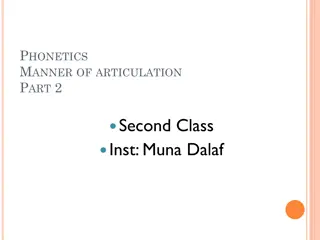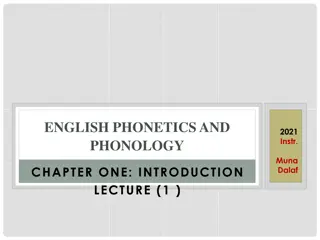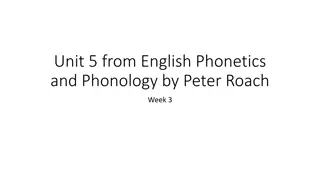Exploring Phonetics and Phonology: A Focus on American English Sounds for Brazilian Learners
This session reviews key aspects of phonetics and phonology, specifically focusing on segmentals and suprasegmentals of English, with an emphasis on the pronunciation of American English sounds. The goal is to help Brazilian learners improve their pronunciation skills to sound more native-like. Topics covered include contrastive linguistics, pronunciation teaching strategies, and English as a lingua franca. Practical exercises and activities are provided to enhance learning.
- Phonetics and Phonology
- American English
- Pronunciation Teaching
- Brazilian Learners
- Language Learning
Download Presentation

Please find below an Image/Link to download the presentation.
The content on the website is provided AS IS for your information and personal use only. It may not be sold, licensed, or shared on other websites without obtaining consent from the author. Download presentation by click this link. If you encounter any issues during the download, it is possible that the publisher has removed the file from their server.
E N D
Presentation Transcript
Phonetics & Phonology John Corbett: USP-CAPES International Fellow Session 14: Review and roundup
Segmentals: Consonants of English Segmentals: Vowels of English Suprasegmentals: Elision, assimilation, stress & rhythm, weak forms Coursetopics revisited Contrastive linguistics: Englishversus Portuguese Teaching pronunciation: Games anddrama activities Englishas a linguafranca: the linguafranca core
Anoverview ofa pronunciationtextbookfor Brazilians Samplesoflearningactivities Yourthoughts? Today s session
The body of the text focuses on the sounds of American English (vowels and consonants), and this variety was chosen as it is most commonlytheoneBrazilianstudents are interested inlearning. Fromthe Preface(p.7) [ ] Brazilians in general have good pronunciation when learning a foreign language. However, according to our personality and characteristics, we want to go beyond intelligibility, as most people want to sound as native-like as possible. This book provides enough practice in foreign accent reduction, introducing students to the pronunciation of English in North America as it is spokenby educated nativespeakers influent speech. The emphasis isin the original text.
Does Portuguese havea final /l/? Do Braziliansin general pronounceit? Whathappensin English? Howdo youpronouncethese words? Unit 4 final /l/ well real table simple cold false Didyour tonguetouchthearea just behind your upperfront teeth every time youpronounce/l/? Were your lipsrounded?
Exercise: Repeatthesewordslookingatyour teachers mouthor atyourselfin themirror. Be careful notto round your lips. kill call Brazil tell possible bicycle jungle uncle shelf milk twelve - old Unit 4 final /l/ Exercise: Repeatthesephrasesafter themodel: allpossible smallbicycle in the middle ofthe table in a littlewhile help oldpeople double trouble wholearticle fillthebottle killa bull
Exercise: Repeatthelinkingsounds. [Note that the/l/ soundis transferredtothe beginningofthefinal word, egBra-zi-liz.] Brazilis peopleare Unit 4 final /l/ beautiful attractions travel on ampleenvironment willenjoy careful about willalways
Exercise: Listentothe recording andcirclethe wordsyouhear. A or B? 1. The woman sewed/soldthe oldclothes. 2. John put the bow/bowlonthetable. Unit 4 final /l/ 3. I likethecoat/colt. 4. Get the first row/role. 5. Do you havea code/cold? Workin pairs. Student A reads out a sentencechoosingoneofthe words, andStudent B hastoidentifywhichwordwasused, A or B.
Exercise: Match thetranscriptionswiththe definitions 1. /sku:l/ 2. / d u: l/ 3. /t a ld/ 4. / l l/ 5. /sm l/ 6. / ni:dl / 7. / h sp tl / 8. /ho l/ a. the placewhereyougo whenyouare sick b. complete c. youuse it tosew d. notbig e. a precious stone f. theplacewhere youstudy g. not an adult h. used todescribe a dog Unit 4 final /l/
Fun time. Do youknowthisfamousAbraham Lincoln quote? In pairs, fillin theblanks withthe wordsin the box. The first pairto complete the quote correctly gets 10 points! Eachword pronouncedcorrectly is worth2 points. Goodluck! Unit 4 final /l/ fool people-all Youcan___ ___ the___ some ofthetime, andsome ofthe ___ ___ ofthetime, but youcannot___ ___ the ___ ____ ofthetime.
Final, unvocalised/l/ isNOTpartofthe linguafranca core. Howwasit for you? Howimportantis it toteach? Isit worthspendingclassroomtime teachingthisfeature? Wouldyoudo it?
Thinkaboutit. Discussthesequestions. Do you pronouncemanandmen in the sameway? Do you thinkBrazilianshaveproblemsdifferentiatingthese sounds? Why(not)? Howis thesound/ / as in catusuallyspelled? Pronounce/ / as in get and/ / as in cat. Nowpronounce in Portuguese. Payattentiontohowmuchyouopen your mouth to pronouncethese three sounds. Nowplace/ / and/ / and in this scale PartC, Unit 2 / / as in <get> / / as in <cat> a) ___ less open b) ___ in between c) ___ more open
Think about it. Discuss these questions. Do you pronounce man and men in the same way? Do you think Brazilians have problems differentiating these sounds? Why (not)? How is the sound / / as in cat usually spelled? Pronounce / / as in get and / / as in cat. Now pronounce in Portuguese. Pay attention to how much you open your mouth to pronounce these three sounds. Now place / / and / / and in this scale PartC, Unit 2 / / as in <get> / / as in <cat> a) / / less open, as in egg b) in between, Portuguese p c) / / more open, as in cat
Exercise: Workin pairs. Articulateoneofthewordsbelow silently. Yourfriend willhaveto identify/ / or / / just by lookingatyour mouth andsaying long or short . Note that ifyoumove your muscles correctlyandpayattentiontoduration, youdon t actually havetohearthe soundtoidentify it. PartC, Unit 2 / / as in <get> / / as in <cat> / / (short) / / (long) ten tan pen pan men man said sad bed bad send sand
Work in pairs. Choose one of the possibilities in each question and ask a classmate. He/Shehas to listen up and give an appropriate free response that shows he/she has identified the sound. Example: What do you use a pedal OR paddlefor? To make a bike go. OR To row a boat. Part C, Unit 2 / / as in <get> / / as in <cat> 1. Do you know why he left/laughed? 2. Why do you need a pen/pan? 3. Why did the man/menrun away? 4. Who is going to marry Ellen/Alan? 5. Where did you find that wonderful gem/jam?
Fun time. In groups, complete the chart with words with // and //. The first group to finish is the winner! Month / / Country / / / / / / Part C, Unit 2 / / as in <get> / / as in <cat> Animal / / Part of the house / / / / / / Food / / Color / / / / / / Object / / Place in town / / / / / /
The // and// phonemesare contrastivein Englishbut accents varya lot, andifyouare consistentin your use, thenintelligibility maynotbe compromised, even ifyoudo notuse thesevowelsin a native-like way. However, according to our personality and characteristics, we want to go beyond intelligibility, as most people want to sound as native- like as possible. Reflections Do you agree?
Probable topics... More IPA transcription practice Accentsof English (NS and NNS) Recognising and teaching intonation patterns ??? Topicsin phonetics Please do the course survey! Have a good recess!!




